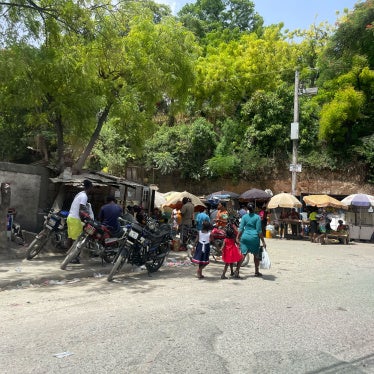Dr. Mauro Andino
Presidente de la Comisión Especializada Permanente de Justicia y Estructura del Estado
Asamblea Nacional de la República del Ecuador
Av. 6 de Diciembre y Piedrahita
Quito – Ecuador
Dear Dr. Andino,
We write today to thank you for meeting with a Human Rights Watch delegation last month to discuss our concerns regarding some key provisions of the Organic Integral Criminal Code (Código Orgánico Integral Penal). We would like to follow up on that discussion to share our concerns regarding the criminalization of abortion, and respectfully urge you to spearhead a reform process to ensure that Ecuador complies with its international human rights obligations.
The UN Committee on the Elimination of Discrimination Against Women (the CEDAW Committee) in 2014 issued a statement calling on states to legalize abortion at least in cases of rape, incest, threats to the life and/or health of the mother, or severe foetal impairment. It also called for states to remove punitive measures for women who undergo abortion. In February 2015, the UN Committee on the Elimination of Discrimination Against Women reviewed Ecuador’s record of compliance with the Convention on the Elimination of Discrimination Against Women, and called on Ecuador specifically to decriminalize abortion in cases of rape, incest, and severe foetal impairment. The committee was unequivocal in its recommendation.
As you may recall, Human Rights Watch has repeatedly called for the decriminalization of abortion in Ecuador. In particular, we urged the National Assembly during its discussion of the draft Organic Integral Criminal Code to include rape as a circumstance under which abortion would not be punishable.
Despite criticisms by Ecuadorian and international human rights groups, the National Assembly only slightly changed the language on non-punishable abortion. The only change made in the code promulgated in February 2014 was to replace the offensive terminology related to women with mental disabilities—instead of saying that only “idiotic and demented” women who are raped can have an abortion, the code now allows abortion for women “with mental disabilities” who are raped. This change was absolutely necessary, but insufficient to bring Ecuador in line with its international human rights obligations.
Ecuador’s current criminal restrictions on abortions have real and damaging consequences for women and girls. Notably, abortion—often performed in clandestine, unsafe conditions due to its illegality—is the second leading cause of female morbidity (disease, disability, or physical harm), and a significant cause of maternal mortality, in Ecuador.
Ecuador’s restrictions on legal and safe abortion, even in the case of rape, also impose unnecessary costs on the state and private health sector, and impair the state’s response to sexual and other gender-based violence. This is a grave concern in a country where, according to government data, one in four women has been a victim of sexual violence.
The law on abortion results in doctors refusing treatment to pregnant rape victims who seek safe abortions. Human Rights Watch spoke to dozens of medical professionals in Ecuador in 2013, some of whom said they had denied comprehensive post-abortion care to rape victims as young as 12 years of age because the law prohibited them from providing abortion services. The new code allows this inhumane treatment of rape victims to continue.
These restrictions to access abortion violate several women’s human rights, including their rights to the highest attainable standard of health, life, nondiscrimination, physical integrity, and freedom from cruel, inhuman, or degrading treatment.
As we discussed in our meeting, Human Rights Watch respectfully urges you to comply with the CEDAW Committee’s recommendation. Specifically, as president of the Justice Commission of the National Assembly, you should push for a reform of the Organic Integral Criminal Code to decriminalize abortion at least in cases of rape, incest, and severe foetal impairment.
Such reform would ensure that victims of violence could seek medical care without fearing criminal penalties. Ensuring access to safe and legal abortion, including in the exceptional instances identified by the CEDAW Committee, can save women’s lives and facilitate women’s equality. In adopting this change to the criminal code, Ecuador would be taking an important step toward protecting women’s reproductive and other human rights.
We sincerely hope you will push forward the process for the National Assembly to review and adopt the recommendations of the CEDAW Committee. Should you require Human Rights Watch’s assistance and support during this process, do not hesitate to contact us.
Sincerely,
Daniel Wilkinson
Liesl Gerntholtz
Cc:
President of the Assembly, Gabriela Rivadeneira








